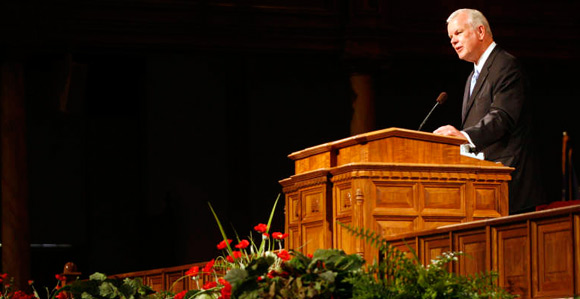New Church Historian Talks about Appreciating Pioneer Legacy
Contributed By By R. Scott Lloyd, Church News staff writer

Elder Steven E. Snow of the Seventy, Church Historian and Recorder, was the featured speaker at the annual Days of ’47 Sunrise Service in the Salt Lake Tabernacle on July 24, 2012, where he spoke of the pioneer legacy all Latter-day Saints share.
“The lessons of the past remain the same and are as applicable as they were to earlier generations. By failing to learn our past, we risk losing a legacy of sacrifice and devotion.” —Elder Steven E. Snow of the Seventy, Church Historian and Recorder
The Mormon pioneers of the 19th century are not so very far removed from the present day, and one need not be a direct descendant to appreciate their legacy, the newly called LDS Church Historian and Recorder said on Pioneer Day, July 24, 2012.
Elder Steven E. Snow of the Seventy was the featured speaker at the annual Days of ’47 Sunrise Service in the Salt Lake Tabernacle, the event that traditionally begins the day’s festivities in downtown Salt Lake City, where President Brigham Young and the vanguard group of pioneers arrived in 1847 and founded the city.
Current generations are inclined to regard the courageous acts of the pioneers as “legendary, almost mythical, as we think back over the many years which have transpired since they first arrived,” Elder Snow observed. “Was it so long ago? Has it been too long and the lessons once taught are no longer relevant to today’s generations?”
A descendant of pioneers Erastus Snow, James G. Bleak, and Archibald Gardner, Elder Snow said he was strengthened while growing up by a “virtual storehouse of stories of strength and faith.”
He told of being a very young boy sitting on a stool in a workshop as his 96-year-old great-grandfather, James Hamilton Gardner, made canes. “My mother told me one moment we would be best friends and the next moment we would be arguing like children,” Elder Snow recalled. Sometime later, he realized his great-grandfather was the son of Archibald Gardner, who joined the Church in 1845, came west, built numerous mills, and helped form settlements in West Jordan, Utah, and Star Valley, Wyoming.
He spoke of recently having viewed old color film footage, shot in 1940, of survivors of the Hole-in-the-Rock expedition in southeastern Utah in 1879-80.
“I was born just a few years later, and it occurred to me my lifetime had overlapped some of those who had made that perilous journey so many years before,” he mused. “Their accomplishments suddenly did not seem so much in the distant past as I had imagined.”
He acknowledged that things do change, “but the lessons of the past remain the same and are as applicable as they were to earlier generations. By failing to learn our past, we risk losing a legacy of sacrifice and devotion, which will ultimately accrue to our own detriment.”
Elder Snow said appreciation of pioneer heritage is not dependent on ancestral lineage.
“We who have grown up in these valleys of the West take justifiable pride in our ties to our pioneer ancestors,” he said. “We often define ourselves by how many ‘greats’ appear before the words ‘granddaughter’ or ‘grandson’ when referring to our famous pioneer ancestors.”
But he then quoted from a famous talk by President J. Reuben Clark given in the Tabernacle during the 1947 pioneer centennial in Salt Lake City.
President Clark, then a member of the First Presidency, said, “In living our lives, let us never forget that the deeds of our fathers and mothers are theirs, not ours; that their works cannot be counted to our glory; that we can claim no excellence and no place because of what they did, that we must rise by our own labor, and labor failing, we shall fall.”
Elder Snow spoke of an experience he had years ago when he attended a Sunday School class in Soweto, South Africa, in which the lesson was about the Mormon pioneers.
“I was confident no one in the room had retraced the Mormon Trail or had ancestors who lived in Nauvoo,” he said. “I did know, however, they appreciated the familiar telling of the westward trek. They understood persecution and the desire to find peace in a new home. They took inspiration from the travails and suffering of the pioneers. With seeming no apparent point of reference or connection other than their membership in the same church, this story became their story.”
Elder Snow explained that Church history no longer is being made just in the towns and cities of the American West. “Today’s pioneers are in Manila, Moscow, and Monrovia, and countless other cities and villages around the world.”
He said many of their recorded experiences are very faith promoting.
Retelling local Church history experiences “teaches the same lessons we are taught from the lives and examples of our own early pioneers,” Elder Snow remarked.
“We are grateful for the resources which have been made available to maintain a small team here at headquarters to help the local Church history advisers around the world as they go about collecting, preserving, and sharing the unique history of these people in their own countries,” he added.
“The recording of such experiences will bless generations which follow. They will understand [that] those who went before, those who did seemingly impossible things, were like them. The youth of today and those who follow know they can do hard things as well. It might not mean trekking across the plains or taking a five-day canoe trip to conference, but because of these strong righteous examples our youth will know they too can make difficult journeys. The figurative handcart they pull will be lighter because of those who have led the way and demonstrated that through faith and courage the impossible can become possible.”
